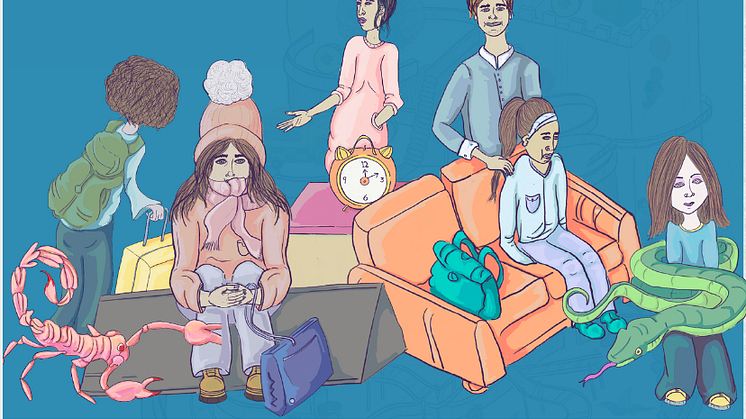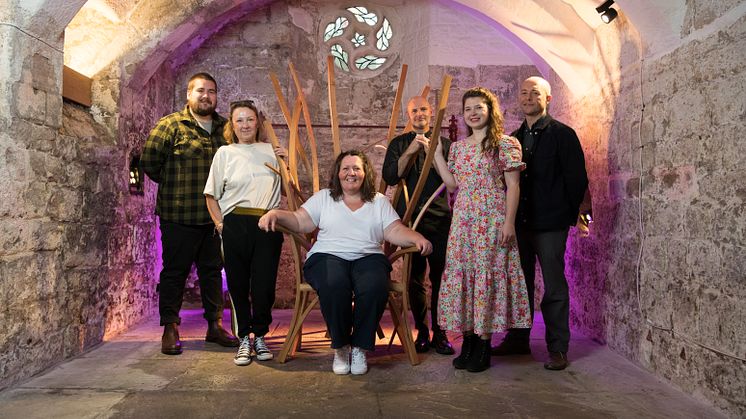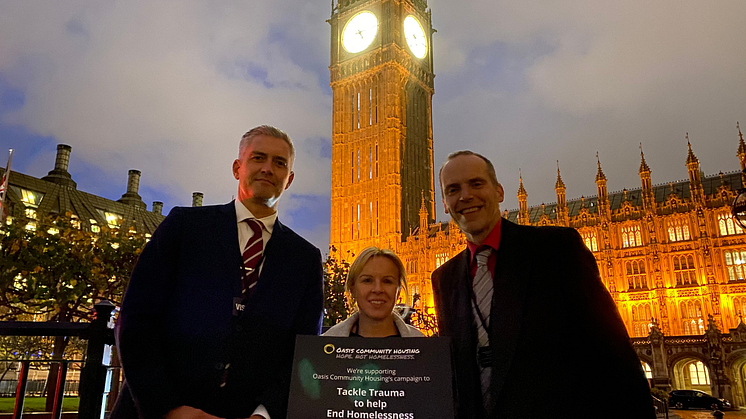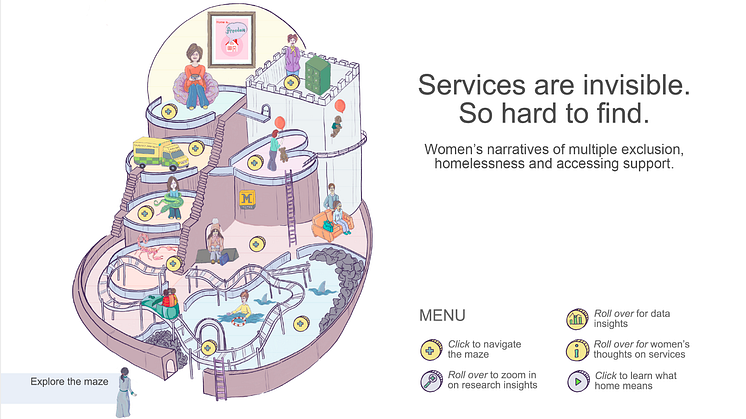
Press release -
Research will inform support services for women experiencing homelessness
Complex stories of homelessness, as told through the experiences of women in the North East of England, are the focus of a study led by Joanne McGrath, a third year PhD student based at Northumbria University.
Joanne’s research focuses on public health and the impacts of health inequalities. She has spent time collating the stories of women in the North East region to explore how issues such as substance abuse, domestic violence, trauma and poor mental health can all contribute to and complicate the issue of homelessness.
Drawing on 10 years of knowledge gained during her time spent working on the frontline at homelessness charity, Crisis, Joanne spent time working with and documenting the experiences of 20 women who are experts by experience. Using their stories, her research explores what is meant by ‘multiple exclusion’ and suggests ways of identifying those at risk of homelessness sooner, in order to tailor support.
“Multiple exclusion recognises the additional complexity of having more than one significant issue at any one time,” explained Joanne. “It looks at how the many factors at play in a person’s life can come together and collectively cause a bigger problem.
“Women dealing with problems such as homelessness, substance abuse, domestic violence and poor mental health tend to be less well served by services and often don’t have an opportunity to have their voices heard.”
For six months, Joanne worked with Gateshead-based Oasis Community Housing to conduct interviews with women who were willing to share their stories. This was followed by a series of workshops for research participants, held at Joe’s Place in Gateshead, a drop-in service which supports vulnerable people in the area.
Sofa surfing was the most commonly reported form of homelessness with reported episodes lasting anywhere between three days and 10 years.
Joanne explained: “This is an important finding because research tells us that women are far more likely to be what we would call ‘hidden homeless’ and often go under the radar. But sofa surfing has a comparable impact on health and wellbeing to rough sleeping in the long term.
“Poor mental health often stemmed from childhood trauma and repeated traumatic experiences throughout the course of their lives. Very few of the women had received counselling or therapy.
“Hopefully, with improved understanding about when and how women with multiple disadvantages use services, more timely interventions can be developed.”
Domestic abuse was a common factor in many of the women’s lives, who described how experiencing domestic abuse further damaged their mental health and self-esteem. However, very few of the women has accessed a domestic abuse refuge, potentially reflecting exclusion criteria for those dealing with other issues such as addiction.
Being a mother was closely linked with some of the women’s identities and the loss of children was identified as a huge source of trauma. Another source of disadvantage was women who have had children taken into care being treated as single in terms of housing priority, limiting their chances of getting their children back.
Many of the women were in contact with support services but a picture emerged of a system which was often difficult to navigate and unresponsive to need. A common theme was their hope of raising awareness of the issues that women face, in order to help those in a similar situation.
Professor Monique Lhussier, Joanne’s PhD supervisor and Director of Northumbria University’s flagship Centre for Health and Social Equity (CHASE), said: “This research is incredibly important in giving a voice to women whose stories are often discredited. It builds on other work we are undertaking around multiple and complex lives and how services could support them more effectively.
“A key issue is that services are by nature specific and siloed, but people’s lives are not. Trauma, mental health, addictions, physical health and social networks interact with one another in a way that is not always predictable or reliable. They lead to sets of behaviours and experiences that would be best supported as a whole, rather than distinct ‘fixable’ entities.”
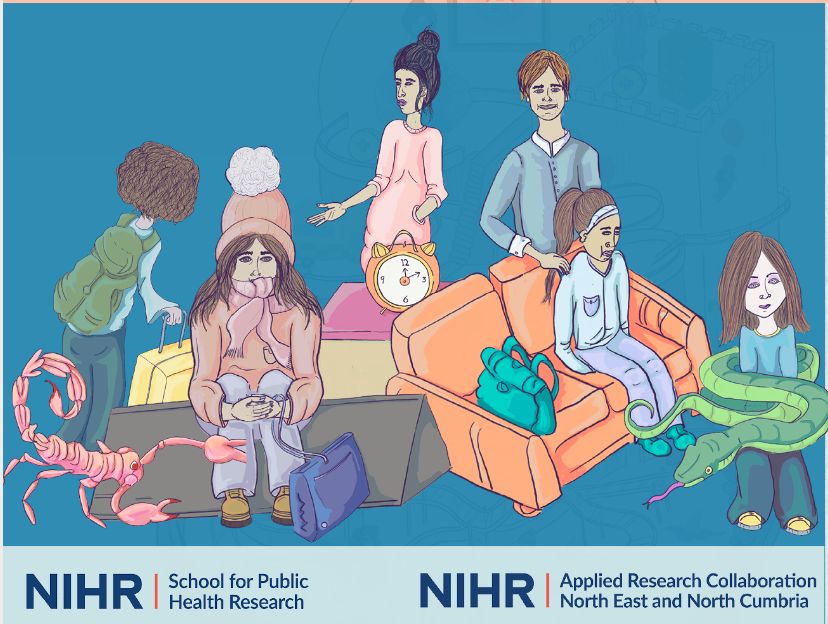
This research is funded by the NIHR School for Public Health Research (SPHR) and the NIHR Applied Research Collaboration North East and North Cumbria (ARC NENC). Northumbria is part of the SPHR through Fuse, the Centre for Translational Research in Public Health which is a consortia of all five North East universities.
It has already informed a research paper, published in the International Journal for Equity in Health, written by Joanne, Professor Lhussier, Dr Natalie Forster from Northumbria’s Department of Social Work, Education and Community Wellbeing, and Dr Stephen Crossley from the Department of Sociology at Durham University.
A second paper was published in the International Journal of Environmental Research and Public Health in June.
Sarah Walters, Head of Best Practice at Crisis, said: “This research shines a light on some of the extreme complexities around homelessness amongst women. Importantly, it highlights that there is currently a real lack of understanding regarding the complicated, interlinking pathways at play here, particularly the importance of healthy social networks – of friends, families, and support networks.
“The powerful testimonies reinforce what we know to be true – that homelessness is a deeply complex issue. It is both a cause and consequence of related health and social issues.
“We know that each person’s experience of homelessness is unique. So, we need an approach that reflects that. The more we understand the factors that are unique to women experiencing homelessness, the more we can do what’s needed to end their homelessness for good.”
Joanne has recently spoken about her research on a podcast run by Fuse, the Centre for Translational Research in Public Health. The podcast is available here.
The research outcomes have also been brought to life on a website developed with support from arts-based researcher, Dr Carmen Byrne, to present visual representations of the lived experiences documented in the study and outline methods for support services to better facilitate change. The website can be viewed here.
Ends
Notes to editors:
About Northumbria University
Northumbria University is a research-intensive university that unlocks potential for all, changing lives regionally, nationally and internationally. Based in the heart of Newcastle upon Tyne, which is regularly voted the best place in the UK for students, Northumbria was named UK University of the Year 2022 in the Times Higher Education Awards.
Find out more about us at www.northumbria.ac.uk
About the NIHR
The mission of the National Institute for Health and Care Research (NIHR) is to improve the health and wealth of the nation through research. We do this by:
- Funding high quality, timely research that benefits the NHS, public health and social care;
- Investing in world-class expertise, facilities and a skilled delivery workforce to translate discoveries into improved treatments and services;
- Partnering with patients, service users, carers and communities, improving the relevance, quality and impact of our research;
- Attracting, training and supporting the best researchers to tackle complex health and social care challenges;
- Collaborating with other public funders, charities and industry to help shape a cohesive and globally competitive research system;
- Funding applied global health research and training to meet the needs of the poorest people in low and middle income countries.
NIHR is funded by the Department of Health and Social Care. Its work in low and middle income countries is principally funded through UK Aid from the UK government.
About Fuse
Fuse, the Centre for Translational Research in Public Health, is a partnership of public health researchers across the five universities in North East England. The Centre works with policy makers, practice partners and the public to improve health and wellbeing and tackle inequalities. Fuse is a founding member of the NIHR School for Public Health Research (SPHR). Find out more here: www.fuse.ac.uk
Topics
Categories
UNIVERSITY OF THE YEAR 2022 (Times Higher Education Awards)
Northumbria is a research-intensive university that unlocks potential for all, changing lives regionally, nationally and internationally. Find out more about us at www.northumbria.ac.uk
--- Please contact media.communications@northumbria.ac.uk with any media enquiries or interview requests ---








